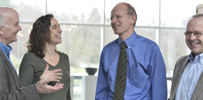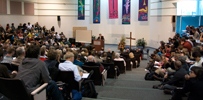Mary McCampbell on Stories, Prophecy, and the Blessing of Douglas Coupland

In this interview, Dr. Mary McCampbell draws us into the theological value of postmodern literature, film, and art. From punk rock to P.T. Anderson, she encourages us to see the spiritual longing present in supposedly post-Christian culture.
Mary is a scholar-in-residence at Regent College for the 2018 winter term, writing a book entitled Postmodern Prophetic: The Religious Impulse in Contemporary Fiction. She is an associate professor of humanities at Lee University in Cleveland, Tennessee, where she teaches courses on postmodern theory and fiction, film and philosophy, and popular culture. A native Tennessean, she completed a doctorate in literature at the University of Newcastle-upon-Tyne.
What brings you to
Regent and to Vancouver?
I’ve long been interested in Regent. I taught at Calvin College for several years, and there are lots of people there who are connected to Regent. I see a nourishing of a faithful, yet deeply gracious—and truly engaging—theology of culture here. Regent seems to take that concept of “common grace” seriously—living it, doing it—and takes it seriously academically. I have also spent time at L’Abri and Regent has had such an influence in that community.
And, the focus of a good deal of my research, the writer and artist Douglas Coupland, lives here, and UBC has his archives (there are 200 boxes and the number keeps growing!). I still can’t believe it all came together for my sabbatical!
Are you missing life in Tennessee?
Well, I confess I do miss my car! That’s really silly, I know.
I miss my students. I miss starting a new semester. Some of my students have written and Facebooked me. I’ve been very involved this past year starting a racial justice advocacy group, working with students of colour at the university, so I especially missed being a part of Martin Luther King Day. I’m passionate about those issues.
Your doctoral work and teaching is focused on postmodern literature and popular culture? Just what is postmodern literature?
The term “postmodern” resists definition. It really depends on whom you are reading. I am thinking of the ways in which these writers critique the myth of modernity, which is the belief that we can bring heaven to earth by relying on human reason to make technological advances that make life both more efficient and more comfortable. In this narrative, we no longer need God, and we become more enlightened as our faith in technology grows.
And, what exactly is “popular culture” and what does a course in it look like?
I am constantly trying to collapse the rigid line often drawn between high and low culture, academia and pop culture. Many of the same basic philosophical questions about truth, human nature, and meaning are asked by each generation. I want to explore the way this is done in art that is accessible to the general public.
In my class we study hip hop, punk rock, popular fiction, film, and even a bit of fashion, among other things. Some of the most fruitful discussions have occurred when students are challenged and given opportunities to think deeply about the culture that they had previously accepted as just the norm. I want students to learn cultural discernment and gain tools for reading their culture.
I strongly believe that we can find truth in many unexpected places, and it excites me to see students make connections between the intellectual, artistic furniture of their day-to-day lives and biblical truth.
How did you get interested in postmodern literature, art, and film?
When I was at the University at Tennessee I took a class on twentieth century fiction but it was not the Americans: it was focused on Booker Prize winners—a lot of British, South African, Canadian, and Australian authors.I noticed that so much of this vastly secular literature had many Biblical references. I was fascinated.
When I went to grad school in the UK, and Newcastle in particular, I ended up doing an MA in Modern and Contemporary Studies, looking at film and literature together. When I was writing my PhD dissertation, I wanted to look at very contemporary literature. There just weren’t many Christians doing this. Christians tend to write on Wendell Berry or Marilynne Robinson, who I love, but their writing is coming from a more overt Christian perspective. I thought I might focus on Margaret Atwood or Michael Ondaatje, but Douglas Coupland came to speak and I happened to be reading his novel Girlfriend in a Coma at the same time. My advisor said, why don’t you write about Coupland? I was thinking it was just fun literature but the more I read, I saw there was so much there that I had just missed. Coupland’s work is particularly prophetic because he focuses so much on the spiritual longings of a supposedly post-Christian culture. I’m so interested in these “cult” authors; they are in this liminal space between academic and popular. Someone like Coupland—he has such a broad fan base that is not generally academic, but there is so much there for academic attention as well.
What do you hope to accomplish in your time at Regent?
I am working on a book on the authors that are in that in-between space—particularly those of interest to younger people—Coupland, Dave Eggers, David Foster Wallace, Nick Hornby, and Don DeLillo. There is a lot that Christians can learn from them; there are so many redemptive aspects to their literature. Theirs is a prophetic critique of our society, of the religion of consumerism. You can see a longing for goodness and truth even in the midst of a spiritual wasteland culture. Douglas Coupland certainly has the most redemptive elements. He’s lamenting the lack of a narrative, the lack of a story.
You have an academic interest and personal passion for film. What captivates you about this medium? Three favourite films?
I love film for some of the same reasons I love literature, particularly its capacity to lead us towards empathy and to uncover truths through commonality and connections. But in film, there is obviously the ability for multiple layers of sensory experience while both the eyes and ears are taking in the story. Seeing a human face and watching human emotion propels us towards empathy. I also love artistic, complex, rich cinematography—and the ways in which metaphor can translate into these visual mechanics of a film.
All three of my favorites are very dependent on music. The music is almost like a character within each film, and the film cannot survive without it.
1) Magnolia by P.T. Anderson: Such a painful, beautiful postmodern parable about the ways in which the sins of the fathers can destroy the “sons”—and the possibility for hope and redemption through forgiveness and truth telling. This is one of the most emotionally complex and powerful films I have ever seen, and, on one level, it is very difficult to watch. The rawness of the intermixing of sacred and profane rings true here, and the viewer feels beaten up after witnessing the ways in which these deeply broken people crash into one another. But there is hope, and it comes in a very surprising (and deeply biblical) way.
2) The Tree of Life by Terrence Malick: This abstract coming of age story has such a pure honesty as it grapples with key human questions about belief in God in the face of suffering. And it is so visually beautiful, so full of joy and lament, so true to the ways in which we experience both beauty and pain. I love watching this film with others because I always feel like I know someone on a much deeper level after sharing this viewing experience.
3) Three Colors: Blue by Krzysztof Kieślowski: Another visually stunning film that deals with the pain of being human. In this case, the focus is on a desire to be free from any relationships in order to protect oneself from further grief or loss. The ending is full of rich, unexpected beauty.
You are giving a noontime lecture at Regent on Coupland's work on Wednesday, February 7th. If I have never read any of his books, will I understand what you are talking about?
Absolutely. I am going to introduce some of the main theological themes in Coupland’s writing, using just enough examples to make you want to run out and read him immediately! I truly believe that Coupland has a lot to teach Christians, so I want to encourage those unfamiliar with his work to come. His writing is very accessible and fun, while at the same time being complex and challenging. This is part of his genius. I can’t wait to introduce his work.
If students or Alumni or friends of the college would like to talk more with you about some of these topics and experiences, can they find you on campus?
Yes! If they want to talk about Coupland, contemporary fiction, Southern literature, racial issues, films, broader theological questions, pop culture—anything!
I plan to be in the college Monday, Thursday, and Fridays—and
some Tuesdays. They can email me at [email protected].




